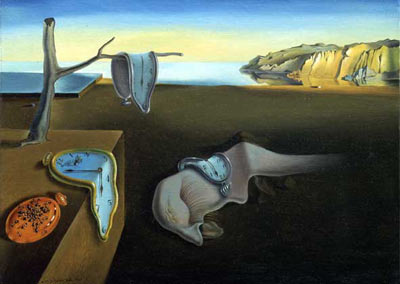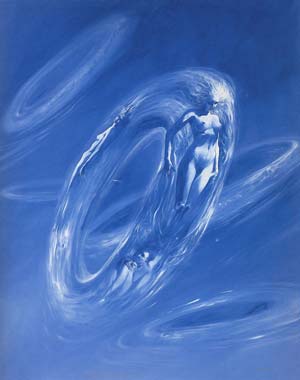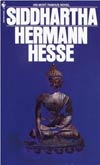The path


I walked forward. Beneath my legs the infinite tape of road ran, above my
head spanned the boundless sky and before me my whole life lay. The next
turn in the road brought me to a… well, it’s hard to say exactly what I saw.
Before me lay many different paths- from stony footpaths meant for hiking
shoes and sore feet, to wide luxurious highways evoking thoughts of
limousines no less. Inviting signs hung at the head of each path. Some were
small and scrawled upon, barely legible, near other paths large billboards
flaunted. Some of them read:
“No one approaches the Father but through me”
Jesus
“There is no God but Allah” Quran (3:16)
"In wine there is truth" Omar Khayyam
My brain worked tensely, trying to combine these obviously contradictory
statements, but nothing came. They are truths, and all great ones. Not
simply pharisaic, but truths proven by the lives and more often the deaths
of thousands of people. What followed naturally was this:
- There is one truth, all others false.
- The truth is multi-faceted and all of them are true.
- The truth cannot be expressed in words.
Or…
My head fought, indecisive, to pinpoint the heart of the matter, until I
found a simple solution. I sat down by the side of the road and rummaged in
my simple worn sack. What do we have here? Some unleavened bread, an onion,
a half-bottle of wine, some cheese and a book. Now I’ll ask the question
“Which road should I take?” I’ll open the book to a random page and I’ll
read until I find the answer. There is nothing accidental in the world so
what I am about to read will not be. I opened the book and began to read:
…Govinda said: "I believe in you and know that you
haven't followed a teacher. But haven't you found something by yourself,
though you've found no teachings, you still found certain thoughts, certain
insights, which are your own and which help you to live? If you would like
to tell me some of these, you would delight my heart."
Quoth Siddhartha: "I've had thoughts, yes, and insight,
again and again. Sometimes, for an hour or for an entire day, I have felt
knowledge in me, as one would feel life in one's heart. There have been many
thoughts, but it would be hard for me to convey them to you. Look, my dear
Govinda, this is one of my thoughts, which I have found: wisdom cannot be
passed on. Wisdom which a wise man tries to pass on to someone always sounds
like foolishness."
"Are you kidding?" asked Govinda.
"I'm not kidding. I'm telling you what I've found.
Knowledge can be conveyed, but not wisdom. It can be found, it can be lived,
it is possible to be carried by it, miracles can be performed with it, but
it cannot be expressed in words and taught. This was what I, even as a young
man, sometimes suspected, what has driven me away from the teachers. I have
found a thought, Govinda, which you'll again regard as a joke or
foolishness, but which is my best thought. It says: The opposite of every
truth is just as true! That's like this: any truth can only be expressed and
put into words when it is one-sided. Everything is one-sided which can be
thought with thoughts and said with words, it's all one-sided, all just one
half, all lacks completeness, roundness, oneness. When the exalted Gotama
spoke in his teachings of the world, he had to divide it into Sansara and
Nirvana, into deception and truth, into suffering and salvation. It cannot
be done differently, there is no other way for him who wants to teach. But
the world itself, what exists around us and inside of us, is never
one-sided. A person or an act is never entirely Sansara or entirely Nirvana,
a person is never entirely holy or entirely sinful. It does really seem like
this, because we are subject to deception, as if time was something real.
Time is not real, Govinda, I have experienced this often and often again.
And if time is not real, then the gap which seems to be between the world
and the eternity, between suffering and blissfulness, between evil and good,
is also a deception."

"How come?" asked Govinda timidly.
"Listen well, my dear, listen well! The sinner, which I
am and which you are, is a sinner, but in times to come he will be Brahma
again, he will reach the Nirvana, will be Buddha--and now see: these "times
to come" are a deception, are only a parable! The sinner is not on his way
to become a Buddha, he is not in the process of developing, though our
capacity for thinking does not know how else to picture these things. No,
within the sinner is now and today already the future Buddha, his future is
already all there, you have to worship in him, in you, in everyone the
Buddha which is coming into being, the possible, the hidden Buddha.
The world, my friend Govinda, is not imperfect, or on a
slow path towards perfection: no, it is perfect in every moment, all sin
already carries the divine forgiveness in itself, all small children already
have the old person in themselves, all infants already have death, all dying
people the eternal life. It is nor possible for any person to see how far
another one has already progressed on his path; in the robber and
dice-gambler, the Buddha is waiting; in the Brahman, the robber is waiting.
In deep meditation, there is the possibility to put time out of existence,
to see all life which was, is, and will be as if it was simultaneous, and
there everything is good, everything is perfect, everything is Brahman.
Therefore, I see whatever exists as good, death is to me like life, sin like
holiness, wisdom like foolishness, everything has to be as it is, everything
only requires my consent, only my willingness, my loving agreement, to be
good for me, to do nothing but work for my benefit, to be unable to ever
harm me. I have experienced on my body and on my soul that I needed sin very
much, I needed lust, the desire for possessions, vanity, and needed the most
shameful despair, in order to learn how to give up all resistance, in order
to learn how to love the world, in order to stop comparing it to some world
I wished, I imagined, some kind of perfection I had made up, but to leave it
as it is and to love it and to enjoy being a part of it.--These, oh Govinda,
are some of the thoughts which have come into my mind."
Siddhartha bent down, picked up a stone from the
ground, and weighed it in his hand.
"This," he said playing with it, "is a stone, and will,
after a certain time, perhaps turn into soil, and will turn from soil into a
plant or animal or human being. In the past, I would have said: This stone
is just a stone, it is worthless, it belongs to the world of the Maja; but
because it might be able to become also a human being and a spirit in the
cycle of transformations, therefore I also grant it importance. Thus, I
would perhaps have thought in the past. But today I think: this stone is a
stone, it is also animal, it is also god, it is also Buddha, I do not
venerate and love it because it could turn into this or that, but rather
because it is already and always everything-- and it is this very fact, that
it is a stone, that it appears to me now and today as a stone, this is why I
love it and see worth and purpose in each of its veins and cavities, in the
yellow, in the gray, in the hardness, in the sound it makes when I knock at
it, in the dryness or wetness of its surface. There are stones which feel
like oil or soap, and others like leaves, others like sand, and every one is
special and prays the Om in its own way, each one is Brahman, but
simultaneously and just as much it is a stone, is oily or juicy, and this is
this very fact which I like and regard as wonderful and worthy of
worship.--But let me speak no more of this. The words are not good for the
secret meaning, everything always becomes a bit different, as soon as it is
put into words, gets distorted a bit, a bit silly--yes, and this is also
very good, and I like it a lot, I also very much agree with this, that this
what is one man's treasure and wisdom always sounds like foolishness to
another person."
Govinda listened silently.
"Why have you told me this about the stone?" he asked
hesitantly after a pause.
"I did it without any specific intention. Or perhaps
what I meant was, that love this very stone, and the river, and all these
things we are looking at and from which we can learn. I can love a stone,
Govinda, and also a tree or a piece of bark. This are things, and things can
be loved. But I cannot love words. Therefore, teachings are no good for me,
they have no hardness, no softness, no colours, no edges, no smell, no
taste, they have nothing but words. Perhaps it are these which keep you from
finding peace, perhaps it are the many words. Because salvation and virtue
as well, Sansara and Nirvana as well, are mere words, Govinda. There is no
thing which would be Nirvana; there is just the word Nirvana."
Quoth Govinda: "Not just a word, my friend, is Nirvana.
It is a thought."
Siddhartha continued: "A thought, it might be so. I
must confess to you, my dear: I don't differentiate much between thoughts
and words. To be honest, I also have no high opinion of thoughts. I have a
better opinion of things. Here on this ferry-boat, for instance, a man has
been my predecessor and teacher, a holy man, who has for many years simply
believed in the river, nothing else. He had noticed that the river's spoke
to him, he learned from it, it educated and taught him, the river seemed to
be a god to him, for many years he did not know that every wind, every
cloud, every bird, every beetle was just as divine and knows just as much
and can teach just as much as the worshipped river. But when this holy man
went into the forests, he knew everything, knew more than you and me,
without teachers, without books, only because he had believed in the river."
Govinda said: "But is that what you call `things',
actually something real, something which has existence? Isn't it just a
deception of the Maja, just an image and illusion? Your stone, your tree,
your river-- are they actually a reality?"
"This too," spoke Siddhartha, "I do not care very much
about. Let the things be illusions or not, after all I would then also be an
illusion, and thus they are always like me. This is what makes them so dear
and worthy of veneration for me: they are like me. Therefore, I can love
them. And this is now a teaching you will laugh about: love, oh Govinda,
seems to me to be the most important thing of all. To thoroughly understand
the world, to explain it, to despise it, may be the thing great thinkers do.
But I'm only interested in being able to love the world, not to despise it,
not to hate it and me, to be able to look upon it and me and all beings with
love and admiration and great respect."
"This I understand," spoke Govinda. "But this very
thing was discovered by the exalted one to be a deception. He commands
benevolence, clemency, sympathy, tolerance, but not love; he forbade us to
tie our heart in love to earthly things."
"I know it," said Siddhartha; his smile shone golden.
"I know it, Govinda. And behold, with this we are right in the middle of the
thicket of opinions, in the dispute about words. For I cannot deny, my words
of love are in a contradiction, a seeming contradiction with Gotama's words.
For this very reason, I distrust in words so much, for I know, this
contradiction is a deception. I know that I am in agreement with Gotama. How
should he not know love, he, who has discovered all elements of human
existence in their transitoriness, in their meaninglessness, and yet loved
people thus much, to use a long, laborious life only to help them, to teach
them! Even with him, even with your great teacher, I prefer the thing over
the words, place more importance on his acts and life than on his speeches,
more on the gestures of his hand than his opinions. Not in his speech, not
in his thoughts, I see his greatness, only in his actions, in his life."
For a long time, the two old men said nothing. Then
spoke Govinda, while bowing for a farewell: "I thank you, Siddhartha, for
telling me some of your thoughts. They are partially strange thoughts, not
all have been instantly understandable to me. This being as it may, I thank
you, and I wish you to have calm days."
(But secretly he thought to himself: This Siddhartha is
a bizarre person, he expresses bizarre thoughts, his teachings sound
foolish. So differently sound the exalted one's pure teachings, clearer,
purer, more comprehensible, nothing strange, foolish, or silly is contained
in them. But different from his thoughts seemed to me Siddhartha's hands and
feet, his eyes, his forehead, his breath, his smile, his greeting, his walk.
Never again, after our exalted Gotama has become one with the Nirvana, never
since then have I met a person of whom I felt: this is a holy man! Only him,
this Siddhartha, I have found to be like this. May his teachings be strange,
may his words sound foolish; out of his gaze and his hand, his skin and his
hair, out of every part of him shines a purity, shines a calmness, shines a
cheerfulness and mildness and holiness, which I have seen in no other person
since the final death of our exalted teacher.)
As Govinda thought like this, and there was a conflict
in his heart, he once again bowed to Siddhartha, drawn by love. Deeply he
bowed to him who was calmly sitting.
"Siddhartha," he spoke, "we have become old men. It is
unlikely for one of us to see the other again in this incarnation. I see,
beloved, that you have found peace. I confess that I haven't found it. Tell
me, oh honourable one, one more word, give my something on my way which I
can grasp, which I can understand! Give me something to be with me on my
path. It it often hard, my path, often dark, Siddhartha."
Siddhartha said nothing and looked at him with the ever
unchanged, quiet smile. Govinda stared at his face, with fear, with
yearning, suffering, and the eternal search was visible in his look, eternal
not-finding.
Siddhartha saw it and smiled.
"Bent down to me!" he whispered quietly in Govinda's
ear. "Bend down to me! Like this, even closer! Very close! Kiss my forehead,
Govinda!"
But while Govinda with astonishment, and yet drawn by
great love and expectation, obeyed his words, bent down closely to him and
touched his forehead with his lips, something miraculous happened to him.
While his thoughts were still dwelling on Siddhartha's wondrous words, while
he was still struggling in vain and with reluctance to think away time, to
imagine Nirvana and Sansara as one, while even a certain contempt for the
words of his friend was fighting in him against an immense love and
veneration, this happened to him:
He no longer saw the face of his friend Siddhartha,
instead he saw other faces, many, a long sequence, a flowing river of faces,
of hundreds, of thousands, which all came and disappeared, and yet all
seemed to be there simultaneously, which all constantly changed and renewed
themselves, and which were still all Siddhartha. He saw the face of a fish,
a carp, with an infinitely painfully opened mouth, the face of a dying fish,
with fading eyes--he saw the face of a new-born child, red and full of
wrinkles, distorted from crying--he saw the face of a murderer, he saw him
plunging a knife into the body of another person--he saw, in the same
second, this criminal in bondage, kneeling and his head being chopped off by
the executioner with one blow of his sword--he saw the bodies of men and
women, naked in positions and cramps of frenzied love--he saw corpses
stretched out, motionless, cold, void-- he saw the heads of animals, of
boars, of crocodiles, of elephants, of bulls, of birds--he saw gods, saw
Krishna, saw Agni

He saw all of these figures and faces in a thousand
relationships with one another, each one helping the other, loving it,
hating it, destroying it, giving re-birth to it, each one was a will to die,
a passionately painful confession of transitoriness, and yet none of then
died, each one only transformed, was always re-born, received evermore a new
face, without any time having passed between the one and the other face--and
all of these figures and faces rested, flowed, generated themselves, floated
along and merged with each other, and they were all constantly covered by
something thin, without individuality of its own, but yet existing, like a
thin glass or ice, like a transparent skin, a shell or mold or mask of
water, and this mask was smiling, and this mask was Siddhartha's smiling
face, which he, Govinda, in this very same moment touched with his lips.
And, Govinda saw it like this, this smile of the mask, this smile of oneness
above the flowing forms, this smile of simultaneousness above the thousand
births and deaths, this smile of Siddhartha was precisely the same, was
precisely of the same kind as the quiet, delicate, impenetrable, perhaps
benevolent, perhaps mocking, wise, thousand-fold smile of Gotama, the
Buddha, as he had seen it himself with great respect a hundred times. Like
this, Govinda knew, the perfected ones are smiling.
Not knowing any more whether time existed, whether the
vision had lasted a second or a hundred years, not knowing any more whether
there existed a Siddhartha, a Gotama, a me and a you, feeling in his
innermost self as if he had been wounded by a divine arrow, the injury of
which tasted sweet, being enchanted and dissolved in his innermost self,
Govinda still stood for a little while bent over Siddhartha's quiet face,
which he had just kissed, which had just been the scene of all
manifestations, all transformations, all existence. The face was unchanged,
after under its surface the depth of the thousandfoldness had closed up
again, he smiled silently, smiled quietly and softly, perhaps very
benevolently, perhaps very mockingly, precisely as he used to smile, the
exalted one.
Deeply, Govinda bowed; tears, he knew nothing of, ran
down his old face; like a fire burnt the feeling of the most intimate love,
the humblest veneration in his heart. Deeply, he bowed, touching the ground,
before him who was sitting motionlessly, whose smile reminded him of
everything he had ever loved in his life, what had ever been valuable and
holy to him in his life."
That was the end of it. I closed the book and looked at
the cover. Yes, certainly these were the ideas of old man Gess.

A sheet of paper dropped out of the book. On it had
been written with care:
" Does this path have a heart?
All paths are the same: they lead nowhere. However, a path without a heart
is never enjoyable. On the other hand, a path with heart is easy—it does not
make a warrior work at liking it; it makes for a joyful journey; as long as
a man follows it, he is one with it.
Look at every path closely and deliberately, then ask ourselves this crucial
question: Does this path have a heart? If it does, then the path is good. If
it doesn't, it is of no use. "
And this is also true I thought.
The sky darkened, thunderstorm closing in, in the distance flashed bolts of
summer lightning.
It was time for my journey to begin…
|